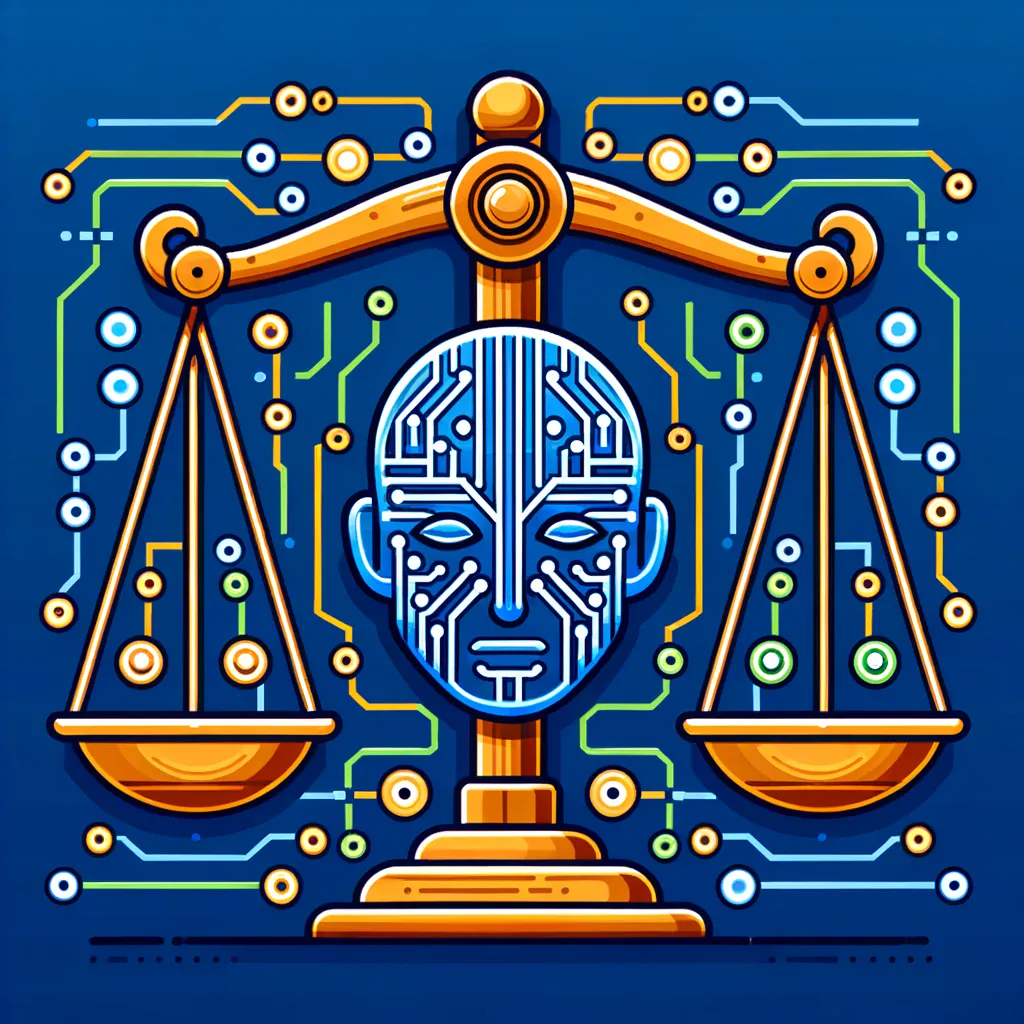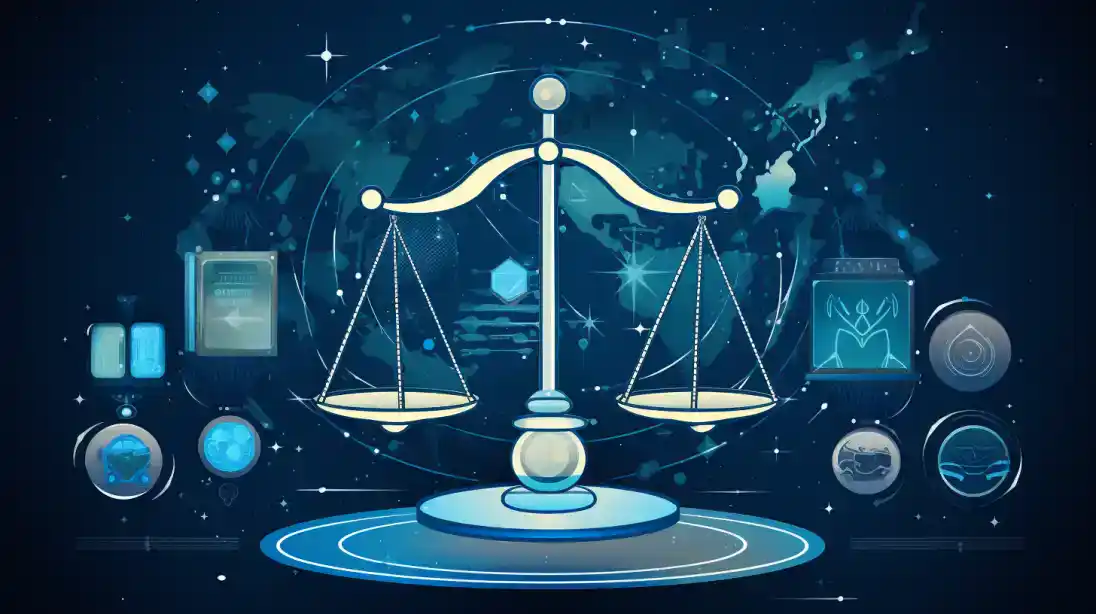In the ever-evolving landscape of AI ethics in HR, the incorporation of Artificial Intelligence (AI) has been a game-changer. From streamlining recruitment processes to enhancing the employee experience, AI ethics in HR has brought significant advantages to HR departments. However, this innovation isn’t without its ethical challenges.
Ensuring fairness in the use of AI in HR processes is a critical concern, as it directly impacts employees and job applicants. This article delves into the nuances of AI ethics in HR, emphasizing the importance of striking a balance between technological advancement and ethical considerations for a fairer workplace.
Table of Contents
The AI Revolution in HR
The integration of AI into HR has revolutionized the way organizations manage their workforce. AI-driven tools and applications have brought several advantages to HR departments, including:
1. Streamlined Recruitment Processes
AI ethics in HR can efficiently sift through a vast number of resumes, identifying the most qualified candidates. AI powered resume screening software not only saves time but also reduces the likelihood of human biases creeping into the hiring process.
2. Improved Employee Experience
Chatbots and AI-driven HR systems can provide immediate responses to employee queries, improving the overall employee experience. Employees can access information and assistance round the clock, leading to increased satisfaction.
3. Predictive Analytics for Retention
AI ethics in HR can analyze employee data to identify patterns and predict which employees are at risk of leaving the organization. HR can then take proactive measures to retain valuable talent.
4. Enhanced Learning and Development
AI can recommend personalized training and development programs for employees based on their skills and career goals. This leads to a more skilled and engaged workforce.
5. Efficient Task Automation
AI ethics in HR can handle routine and administrative HR tasks, freeing up HR professionals to focus on more strategic and value-added activities.
While these benefits are evident, the ethical implications of AI ethics in HR cannot be ignored. Fairness, transparency, and accountability are vital aspects to consider in implementing AI ethics in HR to ensure a fair and just workplace.

The Importance of AI ethics in HR for fairness
Fairness is a fundamental principle in HR: Fairness is at the core of human resources management. It’s the principle that ensures that all employees are treated justly and equitably within an organization. This principle underlines HR practices, policies, and decisions, aiming to provide everyone, regardless of their background, with equal opportunities, rights, and protections.
Organizations strive to create a workplace where employees are treated equitably: Companies and HR departments put in considerable effort to establish a working environment where every employee is treated fairly. Equity in the workplace means that employees are not subjected to discrimination, favoritism, or bias based on any characteristic, such as their race, gender, age, or background.
regardless of their background, gender, or other attributes: This part emphasizes that fairness should be applied universally and without prejudice. It means that employees should be treated fairly regardless of their individual characteristics, such as their cultural background, gender identity, or any other attribute that doesn’t relate to their job performance.
AI, while offering efficiency, can inadvertently introduce biases and discrimination into HR processes if not managed carefully: The introduction of AI into HR processes can enhance efficiency and accuracy, but it also introduces a potential risk.
AI systems, when not carefully designed and monitored, can inherit biases present in the data they are trained on. These biases might lead to discriminatory outcomes in HR processes, such as hiring, promotions, or compensation. This is a challenge that organizations must address when integrating AI into their HR practices.
Addressing Algorithmic Bias
One of the most significant challenges in AI ethics in HR is the presence of algorithmic bias. AI systems are trained on historical data, which can contain biases. If the data used to train AI models reflect historical biases in hiring and promotions, the AI system may perpetuate these biases. This can lead to unfair practices and discrimination in HR processes.
Addressing algorithmic bias requires a thorough examination of the data used to train AI models and implementing strategies to mitigate biases. HR professionals and data scientists must work collaboratively to ensure AI systems promote fairness and diversity.
Transparency and Accountability
To create a fairer workplace, organizations must prioritize transparency and accountability in AI-driven HR processes. Employees and job applicants should have a clear understanding of how AI is used in decision-making. This includes transparency in recruitment algorithms, promotion processes, and other HR functions.
Furthermore, accountability is essential. Organizations must have mechanisms in place to hold AI systems and their developers accountable for their actions. There should be a process in place for rectifying such decisions and preventing future occurrences if AI systems make a discriminatory choice.
Fair Data Usage
Data privacy and fair data usage practices are integral to AI ethics in HR. Organizations must obtain informed consent from employees and applicants regarding the collection and usage of their data. Data should be used solely for HR purposes, and not for any unauthorized or discriminatory activities.
To ensure fairness, organizations should also regularly audit their data handling practices and ensure compliance with data protection regulations.
Striking the Balance: Ethical AI in HR

Achieving a fairer workplace through AI in HR requires striking a delicate balance between technological advancement and ethical considerations. Here are some key strategies to achieve this balance:
1. Diverse Data Sets
One effective strategy to mitigate bias in AI systems is to use diverse data sets for training. This includes data representing various demographic groups, backgrounds, and experiences. By ensuring diversity in the data used to train AI models, organizations can reduce the risk of algorithmic bias.
2. Continuous Monitoring
Continuous monitoring of AI systems is crucial to identify and rectify bias or unfair practices. Regular audits of AI algorithms and decision-making processes can help maintain fairness.
3. Fairness Audits
Conducting fairness audits involves examining AI models and algorithms to identify potential biases. This can be done with the help of data scientists and AI ethics experts who can assess the impact of AI on different groups and make necessary adjustments.
4. Inclusive Design
Designing AI systems with inclusivity in mind is essential. HR professionals should work closely with AI developers to ensure that the technology accommodates a wide range of experiences and backgrounds.
5. Ethical AI Training
Training HR professionals in ethical AI usage is key to promoting fairness. It is vital for those using AI tools to understand the implications of their decisions and how to mitigate bias.
6. Feedback Mechanisms
Establishing feedback mechanisms for employees and applicants is important. They should have a way to report concerns or grievances related to AI-driven HR processes, and organizations should take these reports seriously.
7. Clear Communication
Transparent communication with employees about the use of AI in HR is paramount. Organizations should be open about the tools and algorithms used, how they work, and the steps taken to ensure fairness.
Case Studies in Ethical AI
Let’s explore a couple of case studies to highlight the importance of ethical AI in HR and the positive impact it can have on creating a fairer workplace.
Case Study 1: Gender-Neutral Language Analysis
A multinational corporation decided to use AI to analyze job descriptions and identify any gendered language that might deter certain genders from applying. The AI system flagged problematic phrases and suggested alternatives. This initiative led to an increase in the diversity of applicants, resulting in a fairer and more inclusive hiring process.
Case Study 2: Bias Mitigation in Resume Screening
A tech startup adopted AI to screen resumes for job openings. After noticing that the AI system was rejecting resumes from underrepresented groups, the organization conducted a fairness audit. They discovered that the AI model was biased due to historical data. The organization retrained the model with more diverse data and implemented stricter oversight, resulting in a more equitable recruitment process.
These case studies demonstrate that when organizations proactively address ethical concerns and biases in AI, they can create a fairer workplace and improve their overall performance.
The Role of Regulations
Regulations and legal frameworks play a crucial role in ensuring AI ethics in HR. Governments and regulatory bodies are increasingly recognizing the need for guidelines and laws that govern the use of AI ethics in HR. For instance, the General Data Protection Regulation (GDPR) in Europe places strict requirements on how organizations handle personal data, which includes AI ethics in HR data.
Organizations should keep abreast of evolving AI ethics in HR regulations and ensure compliance to avoid legal repercussions and promote fairness.
Conclusion: A Fairer Future
AI has undeniably transformed the field of HR, offering unprecedented efficiency and insights. However, this transformation should not come at the cost of fairness. Achieving a fairer workplace through AI ethics in HR is not just an option; it’s a necessity. By continuously addressing algorithmic bias, emphasizing transparency and accountability, and following ethical best practices, organizations can create a workplace where AI ethics in HR and fairness go hand in hand. A fairer future awaits when technology and ethics are in harmony in the HR domain.
Related Article: Unlock the Synergy of HR and AI with 5 Awesome Use Cases